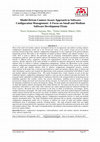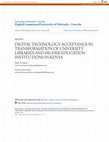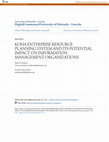Papers by Elisha Ondieki Makori
Advances in library and information science (ALIS) book series, Jun 30, 2023

International Journal of Interactive Communication Systems and Technologies
The paper investigated insights of telecommuting practices and trends in the digital transformati... more The paper investigated insights of telecommuting practices and trends in the digital transformation. Critical objectives were to find the priorities behind telecommuting developments, examine disruption technologies and trends to transform and advance virtual teleworking practices, determine sustainable strategies and programmes for telecommuting arrangements, and explore lessons learned for future prospects from remote working practices. Teleworking practices have opened and expanded economies and business opportunities in organizations worldwide. Trending digital innovations advancing telecommuting in the knowledge economy include internet of things, enterprise mobility, cloud solutions, and blockchain. Robust technological infrastructure, management, communication, and cultural trust are among the top strategies for sustaining telecommuting programmes. In the post-COVID-19 world, telecommuting is fundamental and mandatory, and therefore, leaders, people, organizations, profession...
IGI Global eBooks, Oct 14, 2022

Sustainable Development Goals Series, 2019
Scientific evidence comprises Data, Information and Knowledge (DIK) often presented in a pyramida... more Scientific evidence comprises Data, Information and Knowledge (DIK) often presented in a pyramidal structure. Data are the foundation base of the pyramid, followed by the information layer and the knowledge layer at the top. Data are rudimentary and expand into information and knowledge—the DIK pyramid—and also constitute scientific evidence. Such evidence is critical for demonstrating prospects, best practices and successful development models. The Internet and the evolution of the Web have resulted in easily discernible data that serve as scientific evidence in the form of big data. Transformation of the African continent through the 17 Sustainable Development Goals (SDGs) rests on the availability of scientific data. Data are not a panacea for societal problems but data science can nevertheless open up possibilities for innovations that could help fight hunger, poverty, inequalities and underdevelopment. There is also a huge potential for big data to serve as evidence for successes and failures of the SDGs. However, without its proper creation, planning, verification, storage, security and organisation; big data cannot be used appropriately. This is where Research Data Management (RDM) adds value, mainly because RDM is concerned with planning and organisation of data in the entire research cycle, including the dissemination and archiving of results. This chapter draws on examples from Kenya, Malawi and South Africa to analyse RDM as a strategic imperative for scientific evidence in the transformation of Africa through the SDGs, with a specific reference to SDG 4 on the quality of education.

Most of the small and medium software development firms do not appreciate and embrace existing so... more Most of the small and medium software development firms do not appreciate and embrace existing software configuration management models due to the bureaucratic nature of the models' design and perceived bias portrayal towards large firms. Software configuration management is a key component in the general software engineering process that leads to the realization of quality produced software and software products. As a result, there is need to address this particular gap by proposing contextualized software configuration management model for small and medium software development firms, especially in developing countries that operate in different policy, regulatory, industry and organizational contexts from the firms in developed countries. Specific objectives of the study included: to establish the approach employed by small and medium software firms in relation to software configuration management; evaluate the effectiveness of the existing software configuration management model employed in small and medium software firms; assess the challenges faced by small and medium software firms in software configuration management practice; propose contextualized SCM model that is relevant and beneficial to small and medium software firms in Kenya and other developing countries and evaluate the effectiveness of the proposed contextualized SCM Model in small and medium software development firms. The model developed drew certain elements of each of the four traditional software configuration management models to come up with an enhanced and improved model. The proposed model capitalized on addressing the weaknesses inherent in the existing models by proposing process modelling approach that includes context into process descriptions, enabling process owners to design processes for change and switch such processes during execution. In construction, the proposed model adopted the ideologies of definition of context and design for change. The study sample was selected from the population of small and medium software development firms within Nairobi city. The study used the survey research and naturalistic observation to collect data. Data collected was coded, analyzed using the Statistical Package for Social Sciences, Microsoft Excel and presented in the form of tables of frequencies, percentages, means, standard deviations and graphs. The study results indicated that most of the firms studied employed traditional models whereas minority did not practice any model. In addition, majority firms did not practice conventional and standard phases of software configuration management across all software projects undertaken. The study identified numerous challenges regarding software configuration management practice in small and medium software development firms. This study established strong indication that no specific contextualized software configuration management model was in existence to address the needs of small and medium software development firms in developing countries including Kenya. The study proposed model that was highly approved and recommended by the respondents, since the model captured the aspirations and needs of the small and medium software firms. The study recommends further development of the proposed model into a software tool to be commercialized.

Library Philosophy and Practice, 2016
Introduction and background information Digital revolution is powering and creating a wide array ... more Introduction and background information Digital revolution is powering and creating a wide array of information and knowledge products and services in organizations depend upon the state of the art of information communication technology systems. Development in digital systems has provided technological solutions for academic institutions and information management organizations to access education and knowledge in virtual environments. Higher education and learning institutions across the globe have developed digital technology platforms so as to realize and achieve the goals of the millennium culture and social value. This development affects university libraries because of their perceived role in creation, management, diffusion and utilization of information and knowledge (Makori, 2012). Applications of digital technologies and social computing are fundamental electronic planning solutions not only in institutions of higher learning but also information and knowledge based organi...

International Journal of Library and Information Services, 2021
Demonstrate the impact of the information discipline and profession in transforming and changing ... more Demonstrate the impact of the information discipline and profession in transforming and changing the life of people through sustainable development practices and policies. Quantitative and qualitative research design collected data from information academicians and professionals. Questionnaires and interviews were used to obtain primary data while document analysis and related sources provided secondary information. Decent work and economic growth is the leading and relevant rudimentary goals of sustainable development practices that provides not only perfect employment and wealth creation opportunities but also the fundamental denominator to poverty eradication, food security, quality education, good health and well-being as well as clean water and sanitation. Post-implementation strategies for building sustainable development practices should connect the social, economic and political aspects of people with practical policies.
Library Philosophy and Practice, 2018
Advances in Library and Information Science, 2020
Blockchain revolutionary paradigm is the new and emerging digital innovation that organizations h... more Blockchain revolutionary paradigm is the new and emerging digital innovation that organizations have no choice but to embrace and implement in order to sustain and manage service delivery to the customers. From disruptive to sustaining perspective, blockchain practices have transformed the information management environment with innovative products and services. Blockchain-based applications and innovations provide information management professionals and practitioners with robust and secure opportunities to transform corporate affairs and social responsibilities of organizations through accountability, integrity, and transparency; information governance; data and information security; as well as digital internet of things.

Research Anthology on Collaboration, Digital Services, and Resource Management for the Sustainability of Libraries, 2021
The modern knowledge economy has transformed library and information organizations to adopt and e... more The modern knowledge economy has transformed library and information organizations to adopt and embrace digital social media platforms. Proliferation and growth of social media and social networking technologies continue to play pivotal roles in establishment and operation of digital library and information systems in organizations. The purpose of the chapter is to examine the extent to which information professionals and practitioners understand the impact of social media and social networking technologies on digital library and information systems. The author also analyzes how information professionals manage and promote the adherence to copyright and intellectual property laws in digital library contexts. This chapter specifically discusses the rationale for social media and social networking in digital library and information systems; emerging social media platforms and their applications; legal aspects of social media, copyright and intellectual property protection, and risk ma...

Advances in Library and Information Science, 2021
Industrial revolutions have changed and transformed humanity and society over time and continue t... more Industrial revolutions have changed and transformed humanity and society over time and continue to advance development with evidence across disciplines and professions. The purpose was to explore where the information profession and discipline fit in the broad spectrum of digital transformation and development. It aimed to examine the extent to which digital transformation has enhanced information management in organizations; find out real case applications of the digital transformation and development in information organizations; establish emerging digital technologies in the context of data, information, and knowledge in organizations; and determine professional dimensions and directions imperative for sustaining future digital innovations in organizations. Digital transformation, sustainable development, and the information profession are triple principal forces of human and societal change. The information profession and discipline has influenced and advanced digital transforma...

Library Hi Tech News, 2016
Purpose Modern technological solutions are rapidly changing the information landscape in library ... more Purpose Modern technological solutions are rapidly changing the information landscape in library and information establishments. One such innovative solution that is gaining momentum in information centers is cloud computing. The purpose of this paper is to explore and compare opportunities and challenges of “cloud computing paradigm” in handling and supporting delivery of information services in university libraries in the face of the present hard economic situation and limited financial budgets. Design/methodology/approach The study is based on current academic literature, document analysis, several editorials and articles on the potential and challenges of cloud computing paradigm in university library and information centers. Findings Cloud computing is proving as the best management practice of salvaging information services in university libraries due to numerous competing challenges and issues in institutions of higher education. University libraries in developing countries f...

Library Hi Tech News, 2016
Purpose The purpose of this paper is to focus on Koha enterprise resource planning system and its... more Purpose The purpose of this paper is to focus on Koha enterprise resource planning system and its potential impact on information management organizations in Kenya against the risks and myths associated with the solution. Design/methodology/approach The study focused on selected scan and analysis of information management organizations using Koha enterprise resource planning system in addition to document or desk review analysis. Expert opinions and ideas of information professionals, especially information systems and information leaders, also provided vital knowledge. Findings Koha enterprise resource planning system as the premier and leading free and open-source software is transforming and integrating information services in knowledge-based organizations. Driving significant forces include economical benefits, global customer base, free use and distribution, technical and online support, compatibility and integration with other technologies and global access to information and ...

New Library World, 2015
Purpose– This paper aims to assess practical aspects of implementation of institutional repositor... more Purpose– This paper aims to assess practical aspects of implementation of institutional repositories (IRs) in Africa with reference to the University of Nairobi and provide useful guidelines to the issues and lessons learned to the other practitioners.Design/methodology/approach– The study used cross-sectional descriptive survey design to gather and analyze data that was both qualitative and quantitative in nature. In addition, questionnaires, interview schedule and observation guide were utilized to collect data from the respondents.Findings– First, the study established that the IR has not been well integrated into mainstream information services of the library. Second, there is lack of awareness on the use of IR as an information resource on the part of students and staff. Third, there is need to integrate different forms of information into the IR including graphics, video and sound to carter for the whole population of users even those with disabilities. Finally, there is need ...








Uploads
Papers by Elisha Ondieki Makori